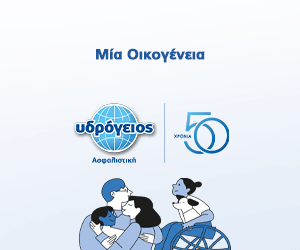 Μία «χειρότερη» λύση για να μην έρθει το μεγάλο «δράμα» της εξόδου από το ευρώ με ανυπολόγιστες οικονομικές και για κάποιους και γεωπολιτικές συνέπειες δέχθηκε χθες τις πρώτες πρωινές ώρες η Κύπρος, μετά από ένα θρίλερ πολύωρων και βασανιστικών διαπραγματεύσεων. Η συμφωνία περιλαμβάνει ότι η Τράπεζα Κύπρου θα λάβει το καλό κομμάτι της Λαϊκής που θα διαλυθεί (σε καλή και κακή) αλλά τα 9 δισ. ευρώ που έχει αντλήσει η Λαΐκή από το μηχανισμό έκτακτης ρευστότητας της ΕΚΤ. Όσο για το κούρεμα στις καταθέσεις στην Τρ. Κύπρου δεν έχει οριστικοποιηθεί.
Μία «χειρότερη» λύση για να μην έρθει το μεγάλο «δράμα» της εξόδου από το ευρώ με ανυπολόγιστες οικονομικές και για κάποιους και γεωπολιτικές συνέπειες δέχθηκε χθες τις πρώτες πρωινές ώρες η Κύπρος, μετά από ένα θρίλερ πολύωρων και βασανιστικών διαπραγματεύσεων. Η συμφωνία περιλαμβάνει ότι η Τράπεζα Κύπρου θα λάβει το καλό κομμάτι της Λαϊκής που θα διαλυθεί (σε καλή και κακή) αλλά τα 9 δισ. ευρώ που έχει αντλήσει η Λαΐκή από το μηχανισμό έκτακτης ρευστότητας της ΕΚΤ. Όσο για το κούρεμα στις καταθέσεις στην Τρ. Κύπρου δεν έχει οριστικοποιηθεί.
Δεν επηρεάζονται οι καταθέσεις κάτω από τα 100.000 ευρώ. Παραμένει στα 10 δισ. ευρώ το ύψος της βοήθειας από την Ευρωζώνη. Ο δρόμος που θα ακολουθήσει είναι μακρύς. Πρέπει να υπογραφούν οι συμφωνίες αλλά και το νέο μνημόνιο και να περάσουν τα κείμενα από έγκριση. Στις αρχές Μαΐου αναμένεται η πρώτη εκταμίευση και εν συνεχεία θα γίνεται σε τριμηνία βάση με βάση την αξιολόγηση της τρόικα. Επίσης, δημιουργείται Task Force για την Κύπρο και η κυβέρνηση δεσμεύεται σε έλεγχο μαύρων κεφαλαίων αλλά και αύξηση φορολογίας.
Η πρόταση «κουρέματος» ξεκίνησε – σύμφωνα με πληροφορίες από 50-60% για να καταλήξει σε ένα «κούρεμα» που προσδιορίζεται από κυπριακές πηγές στο 30% αλλά δεν ονοματίζεται ούτε στο κείμενο των αποφάσεων ούτε στις επίσημες δηλώσεις. Πάντως εκτιμάται ότι είναι μεγαλύτερο από την αρχική πρόταση που δεν αποδέχθηκε η Κυπριακή πλευρά μία εβδομάδα πριν για κούρεμα 15-16%.
Οι διαβουλεύσεις του Προέδρου της Κυπριακής Δημοκρατίας Νίκου Αναστασιάδη δεν έγιναν εντός του Eurogroup αλλά με τους κ.κ. Χέρμαν Βαν Ρομπάι, Ζοζέ Μανουέλ Μπαρόζο, Κριστίν Λαγκάρντ, Μάριο Ντράγκι και Γ. Ντάισελμπλουμ. Εκ των υστέρων το σχέδιο τέθηκε για επικύρωση στο μεταμεσονύκτιο Eurogroup που ήταν να συνεδριάσει αρχικά στις 7 μ.μ. ώρα Ελλάδος.
Ένα παράλληλο δράμα εκτυλίσσονταν στο Προεδρικό μέγαρο της Κύπρου όπου συγκεντρωμένοι οι πολιτικοί αρχηγοί, με πληροφορίες να αναφέρουν ότι ο κ. Νίκος Αναστασιάδης είχε απειλήσει ακόμη και με παραίτηση τους ευρωπαίους εταίρους. Το άλλο δράμα βίωναν οι Κύπριοι που βρίσκονταν στους δρόμους, με το όριο ανάληψης μετρητών να έχει περιορισθεί στα 100 ευρώ, την αγορά να στενάζει από έλλειψη ρευστού και την αγωνία για την τύχη καταθέσεων και οικονομίας που πλέον απειλείται με τεράστια ύφεση (στο καλό σενάριο) να διογκώνεται.
Η Κύπρος ταξίδεψε προς το Eurogroup μην έχοντας εκπληρώσει 2 όρους που της είχαν τεθεί: δεν είχε υπογράψει τις πράξεις για την εκκαθάριση της Λαϊκής τράπεζας (CPB) και δεν είχε επικυρώσει την απορρόφηση των υποκαταστημάτων Κύπρου, Λαϊκής (και ενδεχομένως Ελληνικής) στην Ελλάδα από την τράπεζα Πειραιώς η οποία επιλέχθηκε το απόγευμα της Παρασκευής.
Δείτε την Έκθεση του Eurogroup για τη συμφωνία με την Κύπρο
Eurogroup Statement on Cyprus
The Eurogroup has reached an agreement with the Cypriot authorities on the key elements necessary for a future macroeconomic adjustment programme. This agreement is supported by all euro area Member States as well as the three institutions. The Eurogroup fully supports the Cypriot people in these difficult circumstances.
The programme will address the exceptional challenges that Cyprus is facing and restore the viability of the financial sector, with the view of restoring sustainable growth and sound public finances over the coming years.
The Eurogroup welcomes the plans for restructuring the financial sector as specified in the annex.
These measures will form the basis for restoring the viability of the financial sector. In particular, they safeguard all deposits below EUR 100.000 in accordance with EU principles.
The programme will contain a decisive approach to addressing financial sector imbalances. There will be an appropriate downsizing of the financial sector, with the domestic banking sector reaching the EU average by 2018. In addition, the Cypriot authorities have reaffirmed their commitment to step up efforts in the areas of fiscal consolidation, structural reforms and privatisation.
The Eurogroup welcomes the Terms of Reference for an independent evaluation of the implementation of the anti-money laundering framework in Cypriot financial institutions, involving Moneyval alongside a private international audit firm, and is reassured that the launch of the audit is imminent. In the event of problems in the implementation of the framework, problems will be corrected as part of the programme conditionality.
The Eurogroup further welcomes the Cypriot authorities’ commitment to take further measures. These measures include the increase of the withholding tax on capital income and of the statutory corporate income tax rate. The Eurogroup looks forward to an agreement between Cyprus and the Russian Federation on a financial contribution.
The Eurogroup urges the immediate implementation of the agreement between Cyprus and Greece on the Greek branches of the Cypriot banks, which protects the stability of both the Greek and Cypriot banking systems.
The Eurogroup requests the Cypriot authorities and the Commission, in liaison with the ECB, and the IMF to finalise the MoU at staff level in early April.
The Eurogroup notes the intention of the Cypriot authorities to compensate potential individual victims of fraudulent practices, in line with established legal and judicial procedures, outside the programme.
The Eurogroup takes note of the authorities’ decision to introduce administrative measures, appropriate in view of the present unique and exceptional situation of Cyprus’ financial sector and to allow for a swift reopening of the banks. The Eurogroup stresses that these administrative measures will be temporary, proportionate and non-discriminatory, and subject to strict monitoring in terms of scope and duration in line with the Treaty.
Against this background, the Eurogroup reconfirms, as stated already on 16 March, that – in principle – financial assistance to Cyprus is warranted to safeguard financial stability in Cyprus and the euro area as a whole by providing financial assistance for an amount of up to EUR 10bn. The Eurogroup would welcome a contribution by the IMF to the financing of the programme. Together with the decisions taken by Cyprus, this results in a fully financed programme which will allow Cyprus’ public debt to remain on a sustainable path.
The Eurogroup expects that the ESM Board of Governors will be in a position to formally approve the proposal for a financial assistance facility agreement by the third week of April 2013 subject to the completion of national procedures.
Annex
Following the presentation by the Cyprus authorities of their policy plans, which were broadly welcomed by the Eurogroup, the following was agreed:
1. Laiki will be resolved immediately – with full contribution of equity shareholders, bond holders and uninsured depositors – based on a decision by the Central Bank of Cyprus, using the newly adopted Bank Resolution Framework.
2. Laiki will be split into a good bank and a bad bank. The bad bank will be run down over time.
3. The good bank will be folded into Bank of Cyprus (BoC), using the Bank Resolution Framework, after having heard the Boards of Directors of BoC and Laiki. It will take 9 bn Euros of ELA with it. Only uninsured deposits in BoC will remain frozen until recapitalisation has been effected, and may subsequently be subject to appropriate conditions.
4. The Governing Council of the ECB will provide liquidity to the BoC in line with applicable rules.
5. BoC will be recapitalised through a deposit/equity conversion of uninsured deposits with full contribution of equity shareholders and bond holders.
6. The conversion will be such that a capital ratio of 9 % is secured by the end of the programme.


.gif?rand=4755)
















